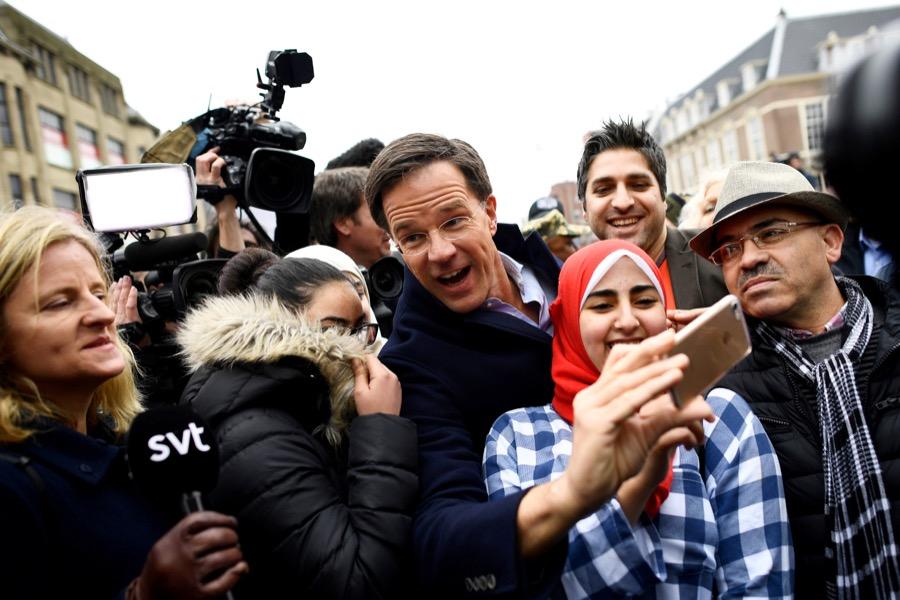The Dutch far-right party of Geert Wilders looks to lose the election — by a lot
Dutch Prime Minister Mark Rutte greets supporters during campaigning in The Hague, Netherlands on March 14.
Dutch Prime Minister Mark Rutte appeared Wednesday to have easily defeated a strong challenge by far-right rival Geert Wilders, in a key election seen as a bellwether of populist support in Europe.
According to exit polls, Rutte's Liberal VVD would scoop up 31 seats, making it the largest party in the new 150-seat parliament, with Wilders and his Freedom Party (PVV) beaten into second place alongside two other parties on 19 seats.
Millions of Dutch had flocked to the polls in a near-record turnout — of 81 percent. The stakes are high in this election, pitting the pro-European Union Rutte against his anti-immigration and anti-EU rival.
Following last year's shock Brexit referendum and Donald Trump's victory in the US, the Dutch vote was being closely watched as a gauge of the strength of populism on the continent ahead of crucial elections in France and Germany.
"I consider it a victory for Europe, because you see a lot of countries where the populist parties are becoming bigger and bigger," Infrastructure and Environment Minister Melanie Schultz van Haegen told AFP.
"I'm very glad that the signal in the Netherlands now is that the Liberal party has become the biggest," said the VVD member.
Rutte is set to get the chance to form the next coalition and could possibly turn to the Christian Democratic Appeal and the Democracy party D66, which both matched Wilders with a predicted 19 seats.
But with the three parties' combined total of 69 seats, he would need another party to reach the 76-seat majority.
'Not rid of me yet'
Wilders had pledged to close the borders to Muslim immigrants, shut mosques, ban sales of the Koran and leave the European Union if he won the polls.
He thanked his supporters in a message on Twitter, with his party looking likely to boost its number of legislators to 19 from 12 in the outgoing parliament.
"We won seats. The first gains are made. And Rutte is not rid of me yet," he said.
Trumpeting the country's economic growth and stability, Rutte is bidding for a third term as premier of the country — one of the eurozone's top economies and a founding EU member.
"This is a crucial election for The Netherlands," said Rutte, adding that it was a chance for a "big democracy" to halt the "domino effect of the wrong sort of populism."
Lines began early at polling stations on a warm day. The 81 percent turnout was just below the record of 88 percent set in 1977.
Amid the tussle between Rutte and Wilders, many of the 12.9 million eligible voters had wavered between the record 28 parties running.
One Muslim voter told AFP she was afraid of Wilders' fiery anti-Islam rhetoric.
"If you have one person who criticizes, it's OK. But every time another person comes and then another one … then it's really hard to defend yourself," said 22-year-old student Khadiga Kallouh.
'Populism doesn't pay'
Luxembourg Prime Minister Xavier Bettel was one of the first to congratulate Rutte.
"Populism didn't pay off," he said in a tweet, offering his congratulations to the VVD for "staying the strongest party."
Tough coalition talks will now follow, aiming to put in place the next government — a process that could take months.
Rutte, who had 40 seats in the outgoing parliament, has vowed never to work with Wilders again. He says he's turned off by Wilders' incendiary message, and after the PVV caused an earlier coalition to collapse.
The "PVV is not such a revolutionary, Trumpian force," Leiden University expert Geerten Waling told AFP.
"People stick to responsible politicians mostly," he said, acknowledging though that the PVV's showing was "not small."
He also pointed to the "disastrous" showing of the traditional Labor party, Rutte's sole partner in the outgoing coalition.
Support for the party appears to have evaporated and it was predicted to lost 29 seats to hold on to just nine.
Labor leader Lodewijk Asscher told supporters late Wednesday "the voters have spoken, difficult as it is, but that is democracy."
One of the biggest winners of the day was the young, charismatic Jesse Klaver, leader of the ecologist left-wing GroenLinks.
In a remarkable turnaround, the party is likely to win 16 seats compared to just four in the outgoing parliament.
By AFP's Jo Biddle and Maude Brulard in The Hague, Netherlands.
